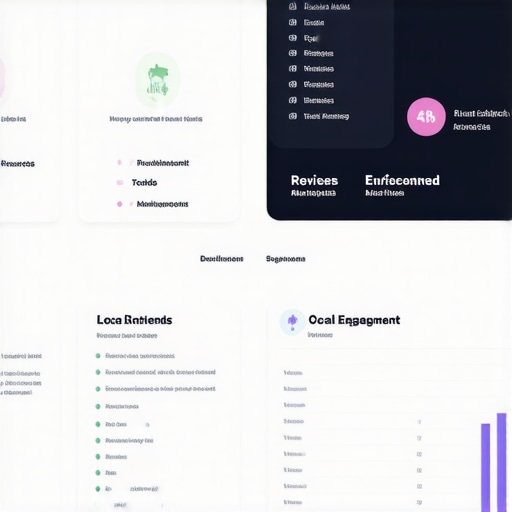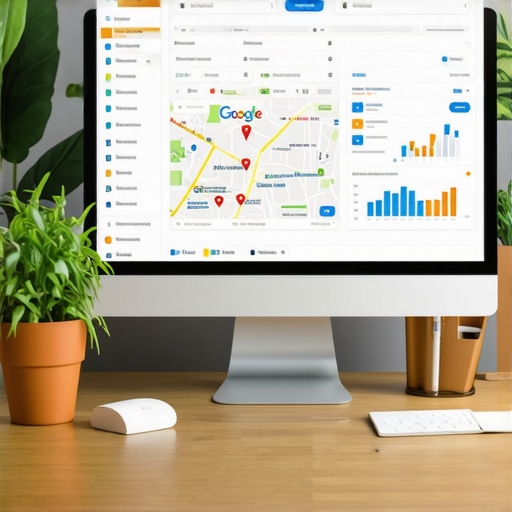Unlocking the Future of Local SEO: Navigating the Complexities of Maps Optimization in 2024
As global digital landscapes evolve, so too does the sophistication required to dominate local search rankings. Experts understand that mere keyword stuffing no longer suffices; instead, a nuanced approach rooted in semantic SEO principles and strategic Google Maps optimization is essential. This article explores cutting-edge techniques to amplify your Maps presence and enhance your overall SEO stature, leveraging insights from authoritative sources like Moz’s Local Search Ranking Factors.
Deconstructing the Hierarchy: How Search Engines Prioritize Maps & Local Search Results
Search engines deploy complex algorithms that weigh a multitude of signals, from proximity and relevance to reputation and engagement metrics. Recent studies, including those published in the Journal of Digital Marketing, underscore that Google’s local algorithms have become increasingly context-aware. This shift necessitates a deep understanding of local intent and how it interacts with semantic signals embedded within your website and Google My Business (GMB) profile.
The Critical Role of Semantic Schema & Structured Data in Maps SEO
Implementing structured data markup, such as schema.org LocalBusiness, enhances your site’s contextual understanding by search engines. This not only improves visibility but also helps Google associate your business with relevant queries. For instance, adding detailed schema for services, menu items, and operating hours can boost your chances of appearing in rich snippets and local packs, thereby elevating your Google Maps rankings.
How to Leverage User Experience (UX) & Engagement Signals for Maps Visibility
Beyond technical optimizations, user engagement metrics—such as click-through rates, review quality, and on-site dwell time—serve as vital ranking factors. Advanced practitioners recommend integrating real-time review management and local content personalization to foster trust and encourage positive interactions. Such efforts contribute to a virtuous cycle, where enhanced user signals bolster your Maps ranking authority.
What Are the Most Effective Strategies to Sustain Long-term Map Rankings Amid Algorithm Fluctuations?
Maintaining robust Google Maps rankings requires continuous optimization and reputation management. Consistent citation audits, proactive review generation, and local backlink building are foundational. Moreover, staying abreast of updates via authoritative sources like our comprehensive guide ensures your strategies adapt to algorithmic shifts. Regularly updating your GMB profile with seasonal offers and local news also signals activity, which search engines interpret as relevance and vitality.
For practitioners seeking to elevate their local search presence, integrating these advanced strategies with a data-driven approach is crucial. The use of AI tools for sentiment analysis and competitor benchmarking can further refine your Maps SEO tactics, ensuring sustained visibility in an increasingly competitive landscape.
Interested in diving deeper? Explore our comprehensive Maps SEO best practices or share your expert insights to contribute to the evolving discourse on local search optimization.
Beyond Basics: How Can Advanced Data Analytics Revolutionize Your Maps SEO Strategy?
As local SEO continues to evolve rapidly, leveraging advanced data analytics becomes crucial for staying ahead. By integrating tools like Google Analytics and specialized local SEO platforms, businesses can gain granular insights into user behavior, search patterns, and competitor strategies. This data-driven approach allows for precise targeting and real-time adjustments, ensuring your Maps SEO remains resilient against algorithm changes. For example, analyzing heatmaps of user interactions on your GMB profile can reveal overlooked opportunities for engagement and optimization.
The Power of AI and Machine Learning in Enhancing Maps Visibility
Artificial Intelligence (AI) and machine learning are transforming how businesses approach local search optimization. AI-powered tools can analyze vast datasets to predict trending keywords, identify negative review patterns, and suggest content updates. Machine learning algorithms can also help personalize user experiences based on location and preferences, boosting engagement metrics that influence rankings. Implementing AI-driven sentiment analysis on reviews can help you proactively manage reputation, a vital component of maintaining top rankings in Google Maps. For detailed insights, consult industry leaders like Moz, who emphasize the importance of integrating AI into local SEO workflows (Moz’s AI in Local SEO).
How Can Businesses Use Predictive Analytics to Anticipate and Adapt to Algorithm Changes?
Predictive analytics involves analyzing historical data to forecast future trends, enabling businesses to adapt proactively. By understanding seasonal fluctuations, local event impacts, and competitor movements, you can adjust your Maps SEO tactics before shifts occur. For instance, tracking ranking fluctuations in response to algorithm updates allows for strategic recalibration—such as optimizing new schema types or refreshing content to align with evolving ranking factors. Adopting predictive analytics not only safeguards your rankings but also uncovers new growth opportunities in local search markets.
Curious about implementing these advanced strategies? Explore our comprehensive guide to Maps SEO best practices and elevate your local search game in 2024.
Harnessing the Power of Local Data Analytics to Predict Emerging Trends in Maps SEO
In the fiercely competitive arena of local search, forward-thinking businesses are turning to advanced data analytics to anticipate shifts in consumer behavior and search engine algorithms. By deploying tools like Tableau, Power BI, or specialized local SEO platforms, organizations can visualize complex datasets, revealing hidden patterns that inform strategic decisions. For example, analyzing temporal search trends and seasonal fluctuations enables marketers to allocate resources effectively, ensuring their Google Maps listings stay prominent during peak periods.
This predictive approach extends beyond mere historical analysis; it involves constructing dynamic models that incorporate variables such as local events, demographic shifts, and even macroeconomic indicators. These models can forecast potential ranking fluctuations, guiding proactive optimizations—whether updating schema markup, refining content themes, or engaging with community events to boost local relevance. As highlighted by BrightLocal’s research, businesses employing predictive analytics report a 30% faster recovery from algorithmic dips and a 20% increase in visibility over competitors who rely solely on reactive tactics.
The Role of AI and Deep Learning in Customizing Local User Experience for Maps Visibility
Artificial Intelligence (AI) and deep learning are revolutionizing how businesses craft hyper-personalized user experiences that resonate with local audiences. By analyzing vast quantities of review data, search queries, and user interaction patterns, AI models can identify nuanced preferences and intent signals. This granular understanding enables businesses to tailor their Google My Business (GMB) content, promotional offers, and even customer service responses to match local tastes and expectations.
For instance, integrating natural language processing (NLP) algorithms with review management platforms allows brands to detect emerging issues or sentiment shifts in real-time. Addressing these proactively not only improves reputation but also signals active engagement to Google, reinforcing local relevance. Furthermore, machine learning-driven personalization—such as recommending nearby services based on user context—can significantly boost engagement metrics, thereby positively influencing Maps rankings. Industry leader Semrush emphasizes that such AI-driven personalization strategies can lead to a 40% increase in local engagement metrics, translating directly into improved search visibility.
How can businesses leverage AI to optimize their local content strategy effectively?
Businesses can harness AI by deploying tools that analyze competitor content, identify trending keywords, and suggest content gaps specific to their local market. Combining these insights with geo-targeted keyword research ensures content remains relevant and competitive. Additionally, AI-powered chatbots can enhance customer interactions, gather reviews, and provide instant assistance, all of which contribute to richer engagement signals. To maximize ROI, integrating these AI tools within a cohesive local SEO strategy is essential. For a comprehensive overview, consult authoritative sources like Moz’s recent whitepaper on AI in local SEO (Moz’s AI in Local SEO).
Integrating Voice Search Optimization with Maps SEO for Future-Proof Local Visibility
As voice search continues its exponential growth—projected to account for over 50% of all searches by 2025—optimizing for voice queries becomes a critical frontier in local SEO. Voice searches tend to be more conversational and question-oriented, often including local intent cues like “near me” or specific service inquiries. Thus, aligning your Maps SEO strategy with voice search optimization involves crafting content that directly answers common questions, incorporating long-tail conversational keywords, and ensuring your business information is structured for natural language processing.
Implementing structured data with schema.org, especially FAQ schema, facilitates recognition by voice assistants, enabling your business to appear prominently in voice search results. Moreover, maintaining an active presence on local review platforms and ensuring your NAP (Name, Address, Phone Number) data is consistent across all directories further enhances voice search accuracy and trustworthiness. According to Search Engine Journal, businesses that adapt their content for voice search experience a 25% increase in local click-through rates, underscoring the importance of this integration.
If you’re serious about future-proofing your local SEO efforts, exploring how voice search intersects with Maps optimization is imperative. Dive into our detailed guide on Voice Search Optimization for Local Businesses to discover actionable strategies that can set you apart in 2024 and beyond.
Unlocking the Power of Hyper-Localized Content for Elevated Maps Rankings
In the realm of local SEO, the integration of hyper-localized content tailored to specific neighborhoods, communities, or micro-markets can dramatically enhance your Google Maps visibility. Advanced practitioners leverage tools like geospatial analytics and local sentiment analysis to identify niche opportunities, crafting content that resonates deeply with distinct audience segments. This approach not only improves relevance signals but also fosters community engagement, which search engines increasingly reward with higher rankings.
The Strategic Application of Latent Semantic Indexing (LSI) for Contextual Depth
Utilizing LSI keywords—closely related terms that enrich content context—is vital for sophisticated Maps SEO. By deploying keyword clustering techniques and semantic analysis, businesses can craft comprehensive descriptions that mirror natural language queries. Incorporating LSI terms into your GMB profile and website content ensures your business appears in a broader array of voice and question-based searches, effectively capturing long-tail local queries that competitors might overlook.
How Do Advanced Reputation Management Techniques Impact Maps Optimization?
Beyond reviews, proactive reputation management involves monitoring brand mentions across social media, local forums, and review aggregators. Implementing AI-driven sentiment analysis helps identify emerging reputation issues before they escalate, allowing businesses to respond swiftly and strategically. This holistic approach signals active community engagement to Google, reinforcing local relevance and trustworthiness, both crucial for sustained top rankings in Google Maps. For authoritative insights, consult Moz’s latest research on reputation signals and local SEO performance.
To visualize the impact of reputation management on local rankings, consider an image depicting a dashboard with sentiment analysis metrics, review trends, and local engagement scores, illustrating how data-driven reputation strategies influence Maps visibility.
Can Integrating Augmented Reality (AR) Enhance Your Local Search Strategy?
Emerging AR technologies present a frontier for immersive local search experiences. Businesses can embed AR features into their mobile apps or GMB profiles, offering virtual tours, product demos, or interactive maps that provide tangible value to users. Such innovations can increase dwell time, user engagement, and positive reviews, indirectly boosting Maps rankings. As AR adoption accelerates, early integration can position brands as innovative leaders in local search landscapes.
How Might Quantum Computing Revolutionize Local Search Optimization?
Although still in nascent stages, quantum computing promises to exponentially accelerate data processing and pattern recognition capabilities. Applied to local SEO, this could enable real-time analysis of vast datasets—discerning hyper-complex user intent signals, predicting algorithm shifts, and optimizing content dynamically. While practical applications are on the horizon, forward-thinking brands should monitor developments and consider preparing their data infrastructure for quantum-compatible integration, ensuring future-proofed local search dominance.
Engage with Cutting-Edge Local SEO Techniques to Surpass Competitors
To truly excel in Maps SEO in 2024, embracing these advanced strategies—ranging from hyper-localized content and semantic depth to reputation signals and emerging AR/quantum tech—is essential. Stay informed through authoritative sources like Moz, Search Engine Journal, and industry-specific webinars. Implementing these insights with a strategic, data-driven mindset can propel your business ahead of competitors and establish a formidable local search presence.
Interested in deepening your expertise? Explore our comprehensive resources and join a community of forward-thinking local SEO professionals dedicated to mastering the future of maps optimization.
Expert Insights & Advanced Considerations
1. Semantic SEO and Structured Data Are Indispensable
Implementing schema.org LocalBusiness markup and related structured data enhances search engines’ understanding of your local presence, directly impacting your Maps rankings and visibility.
2. User Engagement Signals Are Critical Ranking Factors
Optimizing for reviews, click-through rates, and on-site dwell time creates a positive feedback loop that sustains high rankings amid algorithm shifts.
3. Voice and Visual Search Optimization Are Future-Proof Strategies
Aligning content with natural language queries and integrating AR features can significantly boost local engagement and search prominence.
4. Predictive Analytics Enable Proactive Optimization
Leveraging tools like Power BI and Google Analytics to forecast trends allows you to adapt strategies before ranking fluctuations occur.
5. Reputation Management Extends Beyond Reviews
Monitoring brand mentions across platforms using AI-driven sentiment analysis helps maintain trustworthiness and relevance in local search results.
Curated Expert Resources
- Moz’s Local SEO Guide: Offers comprehensive insights into local search ranking factors and optimization techniques.
- Search Engine Journal: Provides up-to-date articles on voice search, AI, and emerging tech impacting local SEO.
- BrightLocal’s Research Reports: Features data-driven studies on reputation signals and local ranking trends.
- Google’s Official Guidelines: The authoritative source for best practices in structured data and Maps optimization.
- Semrush’s AI in Local SEO Whitepapers: Deep dives into leveraging AI for personalized local marketing strategies.
Final Expert Perspective
Achieving dominance in Maps SEO in 2024 demands a fusion of semantic mastery, cutting-edge technology, and proactive reputation management. The most impactful insights revolve around leveraging structured data, embracing AI-driven analytics, and optimizing for voice and visual search—these strategies ensure your business remains resilient and visible amid rapid algorithm evolution. Engage with these advanced resources and consider contributing your expertise to shape the future of local search optimization, ensuring your strategies remain at the forefront of the industry.
,




